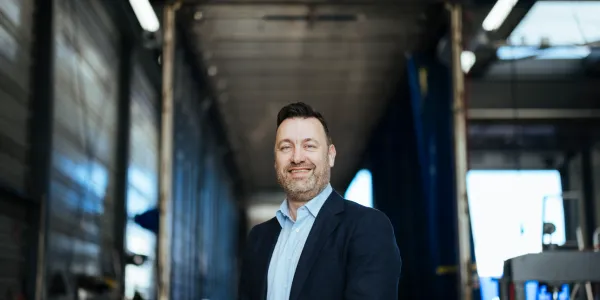How upcoming CO2 regulations could reshape Europe's trailer industry
This article was originally published by Nieuwsblad Transport
Trailers will become significantly more expensive in five years. New emission regulations will drive up prices, which means that transport companies will be forced to use old trailers for much longer. At least, this is the expectation of Diederick van Haselen, Global Equipment Director at TIP Group.

We already know that trucks must become increasingly fuel-efficient, with manufacturers expected to reduce CO2 emissions by 90% by 2040 compared to 2019. But what exactly do the emission regulations for trailers entail?
"There’s new legislation from Brussels. It dictates that trailers must reduce their CO2 emissions by 10% by 2030 compared to now. A trailer is supposed to save on CO2 emissions, but trailers don’t even have engines. Yes, a refrigerated trailer has a cooling engine, but 70 to 80% of trailers don’t have an engine and emit nothing. So how are you supposed to save CO2? To calculate emissions, the European Commission has developed VECTO, the Vehicle Energy Consumption Calculation Tool. There is a gap between aspirations and reality.
The tool primarily takes two factors into account: weight and aerodynamics. If you reduce weight, you score better in the VECTO calculation. That’s all very nice, but trailers lead a tough life on the road. The lighter you make them, the shorter their lifespan becomes. This would mean building more trailers, which is harmful to the environment. But the VECTO tool doesn’t account for that. It’s the same with aerodynamics. You can add spoilers, but a trailer with protruding parts won’t fit on a train. And many trailers travel partly by road and partly by rail. So, there are aspects that actually do more harm to the planet. You could save CO2 during the production of trailers, but the VECTO tool doesn’t cover that."
What are the consequences if a trailer doesn’t meet the 10% reduction?
“There’s a fine of €4,250 for each percentage point you fall short. According to specialists who have tested the tool, the maximum reduction you can achieve is 5 to 7%. So you’re quickly looking at fines of €12,000 to €21,000 per trailer. That might not seem like a lot, but an average trailer costs roughly €30,000. If manufacturers pass on the fines, it would almost double the price. Transport companies typically make a profit margin of 0 to 2%, so they simply can’t afford this.”
What’s the way forward?
“I envision scenarios somewhat similar to Cuba, where old vehicles are still in use. While trucks eventually need to be replaced due to increasing engine costs and wear on parts, trailers can be continuously repaired, postponing replacement until absolutely necessary. I also foresee challenges for many European trailer manufacturers, or even bankruptcy, as they may struggle to adapt. They will have to switch to refurbishing trailers, but they can’t sustain themselves with their current setups.
If this plan is so unrealistic, why was it created?
“Truck manufacturers have been under pressure for decades to reduce CO2 emissions, starting with Euro 1 and soon Euro 7. The trailer industry isn’t as well-represented in Brussels as the truck industry, which has the ACEA lobby group. Initially, the European Commission wanted a 15% reduction. Trailer manufacturers negotiated that down to 10%. I would have handled it differently; I think that was not the good strategy. By doing so, they essentially admitted that trailers emit CO2. Let’s consider a hypothetical example. Imagine if Brussels demanded that all ski resorts have purple snow. Naturally, no resort in Europe would agree to such demand; there would be lawsuits because purple snow doesn’t exist. You wouldn’t negotiate for slightly less purple snow, perhaps making it pink instead. Yet, in a similar way, that’s essentially what happened with the trailer industry. Now, there’s a lot of focus on a computer tool that leads to poor decisions, which negatively affects the entire transport industry, trailer factory workers, and ultimately taxpayers. Meanwhile, you hear much less about ideas that could really make a difference, like a Super Eco-Combi. Or an e-reefer, a refrigerated trailer that generates its own electricity for the cooling engine using a generator in the axle. Such a trailer doesn’t need diesel anymore. Across Europe, there’s little attention to this. In the Netherlands, you can’t even register it. In Germany, however, you can."
What impact will the emission rules have on TIP?
"Something big is coming, and it’s definitely occupying our attention. We have the largest trailer fleet in Europe, so we can keep going for a while. But we are already factoring 2030 into our strategy."
In what way?
"We’re considering bringing some investments forward. But we’re also keeping in mind the scenario that it might not happen at all. This is such a significant shift, and as it stands on paper, all major trailer manufacturers will face serious challenges. Large fleet owners will push forward their investments and then delay them for a long time afterward. So, for several years after 2030, almost no trailers will be produced. And that would affect us too, even if only one trailer manufacturer goes bankrupt."
Source: Nieuwsblad Transport
Join the conversation! Follow TIP on LinkedIn for the latest updates, insights, and industry solutions on sustainable transport.



